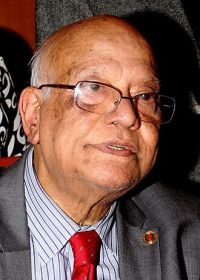Muhith, Abul Maal Abdul

Muhith, Abul Maal Abdul (1934-2022), civil servant, diplomat, politician, environmentalist, writer-researcher, language activist and Freedom Fighter. Abul Maal Abdul Muhith was born in a noble family on 25 January 1934 in the Dhopadighir Par of Sylhet city. His father Abu Ahmad Abdul Hafiz was a renowned lawyer and language activist and his mother Syeda Shahar Banu Chowdhury was a politician and language activist. He passed his Matriculation from Sylhet Government Pilot School in 1949 and Intermediate from Murari Chand (MC) College in 1951 securing first position in order of merit in the Board. Muhith obtained his BA (Hons.) degree securing first class first position in English Literature and MA degree from the Department of English, Dhaka University. He earned higher degrees on political economy from both Oxford University and Harvard University.
After joining the Pakistan Civil Service (CSP) in 1956, Muhith played a key role in the East Pakistan provincial government, central government of Pakistan and, then, government of Bangladesh. He prepared a report on the disparity between East and West Pakistan in 1966, when he was the chief and deputy secretary (1964-66) of Pakistan Planning Commission. In July 1969, he was appointed the economic counselor at the Pakistan Embassy in Washington, DC, USA. After the liberation of Bangladesh, he was appointed the Finance and Planning Secretary in 1972 and Secretary of the External Resource Department of Finance and Planning Ministry in 1977.
Muhith, as a member of renowned political family, joined politics in his early life. In 1948, he joined liberal student politics and played a key role in the language movement of East Bengal. He was also one of the important leaders of the Central Language Action Committee. At that time, he was elected Joint Secretary (1952-53) of Salimullah Muslim Hall Students Union at Dhaka University. Muhith, a famous civil servant and diplomat of his time, took self-retirement from his professional carrier and, then, joined Ershad government as the Finance and Planning Minister. He served the Ershad government from March 1982 to December 1983. Later, he resigned from the Ministerial post when General Ershad declared to form a political party to consolidate his autocratic power. When he was abroad, Muhith played a significant role in making public opinion, delivering speeches in various public forums and leading protests against the autocratic regime of Ershad. He returned to Bangladesh after the fall of Ershad and engaged himself with different liberal, political, social and cultural activities. In 2001, he joined the Bangladesh Awami League. Muhith was elected Member of Parliament from Sylhet-1 constituently as a candidate of Awami League in the 2008 and 2014 parliamentary elections. He served as the Finance Minister of the Government of Bangladesh from 2009 to 2018 and had the rare privilege of presenting budgets for 12 times in the parliament.
During the Liberation War of 1971, he resigned from the Pakistani Embassy in Washington DC and paid his allegiance to the mujibnagar government. Then, in the United States, he worked for creating public opinion in favour of Bangladesh’s independence, communicate with Congressmen as lobbyist and influence different international forums. After the independence of Bangladesh, he joined different international institutions, playing pivotal role in fostering socio-economic development and shaping the image of Bangladesh. In 1972, Muhith returned to the USA and joined as Economic Minister of Bangladesh Embassy in Washington DC. Meanwhile, he acted as the first Alternative Executive Director of Bangladesh in the World Bank. In 1974, he joined the Asian Development Bank (ADB) as the Managing Director. He worked for the Ford Foundation and the International Fund for Agricultural Development (IFAD) as economic and development expert. Muhith was the first Chairman of the Economic and Social Commission for Asia and the Pacific (ESCAP) from Bangladesh. He worked in a board of experts in defining the role of the United Nations Development Programme (UNDP).
Muhith had a great interest in education and research. He was the visiting fellow of Princeton University from 1984 to 1985. He was the author of more than 30 books and 700 articles. His noted books include Bangladesh: Emergence of a Nation (1978), Thoughts on Development Administration (1981), Problems of Bangladesh– An attempt at survival (1986), Bangladesh: Punorgothon o Jatiya Oikkomotto (1991), American Response to Bangladesh Liberation War (1996), Smriti Omlan 1971 (1996), Bangladesh in the Twenty-first Century: Towards An Industrial Society (1999), Bangladesh: Jatirastrer Udvob (2000), Jelay Jelay Sarkar: Sthaniyo Sarkar Ainsomuher Ekti Porjalocona (2002), An Agenda for Good Governance: From lawlessness and corruption to a caring and prosperous democracy (2007), The State Language Movement in East Bengal 1947-1956 (2008), Bangabandhu and Bangladesh (2013), and Smritir Monikothay (2014).
Muhith was honoured with the ‘Tamgha-e-Pakistan’ award by the Pakistan government for his honesty sincerity and efficiency. But he abandoned this award when he took position in favour of Bangladesh’s independence in 1971. Muhith was awarded with the Independence Award (Swadhinata Padak) 2016 for his contributions to the Liberation War of Bangladesh. He was the founding Chairman of the Bangladesh Poribesh Andolon (BAPA) and two times’ elected Chairman (1999 and 2001) of the Dhaka University Alumni Association. The name of ‘Sylhet District Sports Complex’ had been changed into ‘Abul Maal Abdul Muhith Sports Complex’ in 2015 as a token of honour of this legendary person. He died on 29 April 2022 in Dhaka. [Abu Sufian]
Bibliography আবুল ফতেহ ফাত্তাহ (সম্পা.), প্রজ্ঞাদীপ মুহিতমানস, সিলেট, প্রত্নপাঠ ২০১৫; A.M.A. Muhith, Bangladesh: Emergence of Nation, Dhaka, UPL 197; আবুল মাল আবদুল মুহিত, স্মৃতিময় কর্মজীবন, ঢাকা, চন্দ্রাবতী একাডেমি ২০১৭; আবুল মাল আবদুল মুহিত, স্মৃতি অম্লান ১৯৭১, ঢাকা, প্রথমা প্রকাশন ২০১৭
